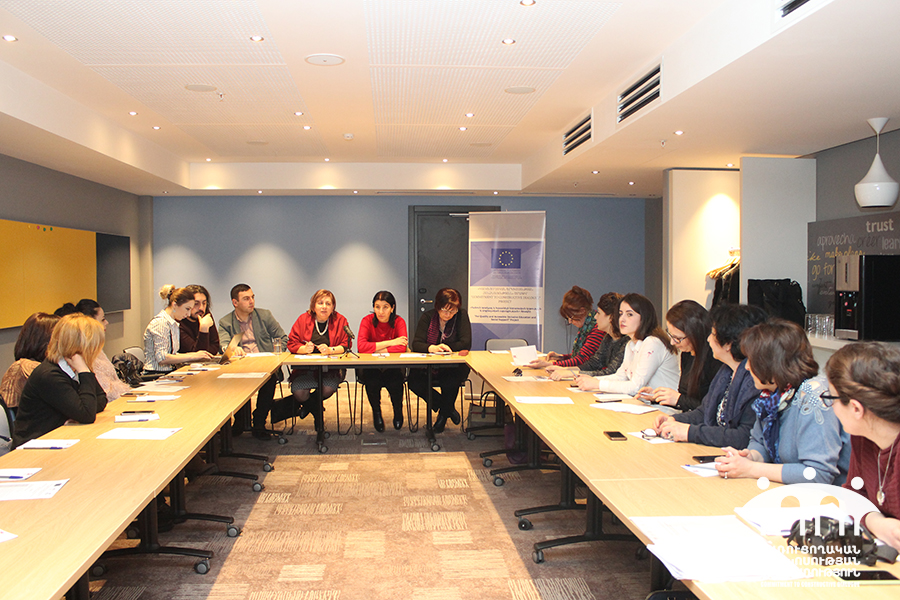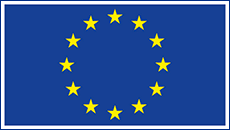
On 20 February 2019, the assembly of the coalition formed within the “Capacity Development of the Inter-Community Coalition Dealing with Issues of Children with Disabilities” project implemented within the “Commitment to Constructive Dialogue” project.
The coalition is implementing the sub-grant project entitled “For Quality and Accessible Inclusive Education and Social Support” and funded by the European Union through the CCD project in the Armavir, Gegharkunik, Kotayk and Vayots Dzor regions.
“The main goal of the project is to reveal inclusive education problems, create working groups and discuss with them, give solutions to those issues, draft a concept note and submit it to the ministry,” said “For Quality and Accessible Inclusive Education and Social Support” Project Manager Naira Arakelyan.
In her words, the project was more needed in these regions as the reorganisation process of special schools started in the Armavir Region in 2018 and there are no special schools in the Gegharkunik, Vayots Dzor and Kotayk Regions.
Expert Serob Khachatryan joined the participants through a video call and presented the report of monitoring of inclusive education in those regions. He noted that 3 schools were monitored in each region.
“There have been in-depth interviews with school headmasters, the support team representative, focus group discussions with parents were organised. Evaluation of the entire physical environment of the school was carried out.
We tried to understand the following problems: how the evaluation of children’s educational needs is carried out, how support is provided tot children, how children’s inclusion in the main educational process takes place and how cooperation between parents and the school is carried out,” Serob Khachatryan noted.
In his words, the problem of children’s educational needs continues to be remain pressing. In order to get their children engaged in inclusive education, parents mainly present serious problems in a mild form. Exclusive cases also occur when small issues are made complicated by parents.
Serob Khachatryan noted that in order to succeed in the introduction of the inclusive education system in Armenia, it is necessary to change the operational structure of the entire system of education. He noted that among the recommendations prepared was the formation of a team conducting trainings for participants of inclusive education, a team which would have studied international experience and would be really well aware of the issue; strengthening this component in pedagogical universities as teachers’ opposition is currently also a problem for the implementation of inclusive education. Apart from these, a map of successful experience of schools should also be created, financial calculations must be carried out on the amount that introduction of inclusive education would cost Armenia.
Almast Safaryan, a representative of the “Hope-98” NGO for Vayots Dzor Development, noted that it’s a question of whether there has been an evaluation in any inclusive school until today, what kind of progress has been recorded among children studying in public schools with inclusive education, what is the reason that in case of similar children one kid studies well while the other struggles.
“How children’s evaluation will be carried out is also a serious issue: Children are taken 130 km away, going to Yerevan, which implies different psychological conditions for the child who ends up with different results,” he noted.
President of the Association of Young Reporters Arman Ghazaryan said that specialists are needed for the reevaluation of children involved in the inclusive education programme in regions. “The evaluation that is carried out within 1-2 hours cannot be deemed productive as the child is out of his/her circle, does not feel free and it greatly affects his/her behaviour and test assessment,” he said.
Meline Ayvazyan, a representative of the “Armavir Development Centre” NGO, presented the goal of the “Capacity Development of the Inter-Community Coalition Dealing with Issues of Children with Disabilities” project.
In her words, the main goal of the project is to strengthen the coalition for the sake of universal inclusiveness and social support.
She also indicated the specific project objectives:
- Carry out needs assessment of coalition member organisations;
- Develop the internal and external capacities of the coalition;
- Develop the sectoral capacities of the coalition, related to inclusive education and social support;
- Unite the coalition’s forces and capacities for the sake of public policy implementation.
The “Commitment to Constructive Dialogue” project is implemented with the financial support of the European Union by a consortium of civil society organizations, which are the “Armenian Lawyers’ Association” NGO, Agora Central Europe o.p.s (an NGO from the Czech Republic), the “Armenian Center for Democratic Education-CIVITAS” NGO, the “International Center for Human Development” Public Organization, the “SME Cooperation Association” NGO and the Union of Communities of Armenia.
The overall objective of the project is to enhance the influence of CSOs and their coalitions (networks) on the public policy process. This will enable the organizations (that already work in target coalitions) to gain new resources, unite civil society experts and encourage them to participate in the formation of local and national policy agenda, identify the common problems and priorities and to apply to the government with constructive and strategic policy initiatives.
In the scope of the project, sub-grants have been provided to CSOs and CSO coalitions, aiming at public policy development and achieving tangible results in the 9 target sectors: justice, human rights, public finance management, business, education, social sector: social inclusion of children with disabilities, agriculture, economy, energy.


